AI chatbots for customer service have become more popular than ever. How can ...
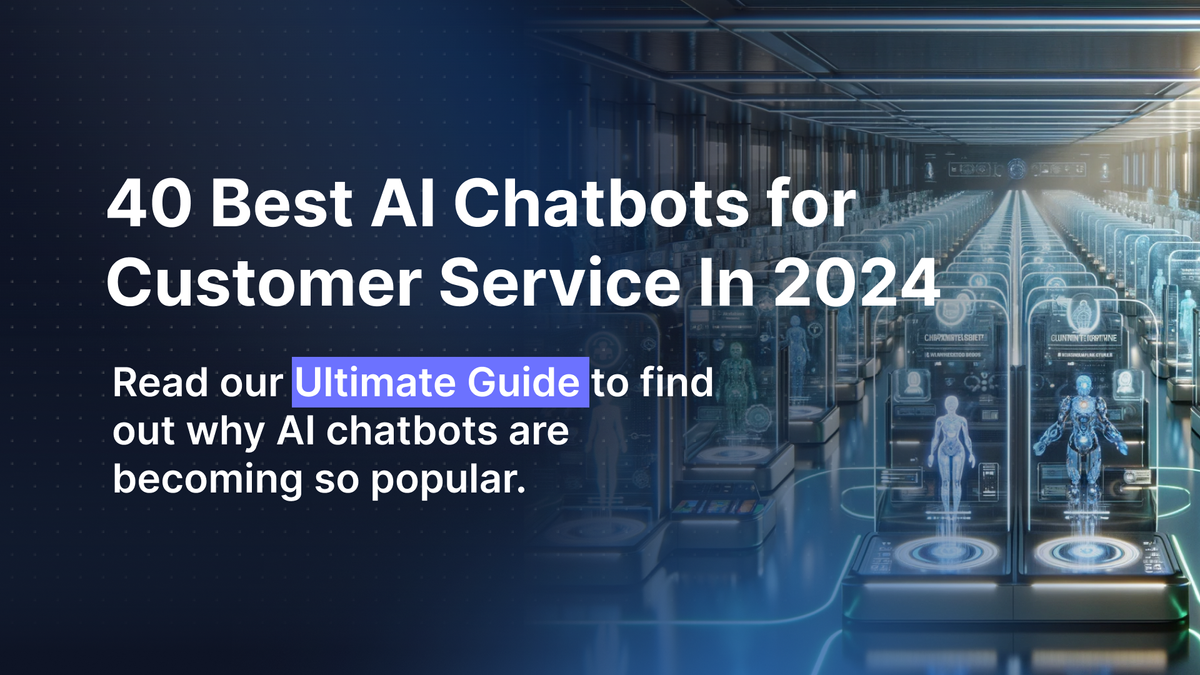
AI customer service has seen a significant transformation in recent years, with companies competing to offer personalized communication, self-service support, and much more. Although these are pressing requirements, AI chatbots can help companies meet and exceed them. However, it can be challenging to pick suitable AI chatbot for customer service, given the sheer number available today.
It also doesn’t help that all of them claim to be the best in the business. With the AI chatbot market expected to reach $15.5 billion by 2028, the number of choices will keep increasing.
Therefore, we have prepared this detailed guide for you. It will help you understand different chatbots, their features, such as automation, and much more. So, read on and find out which AI chatbots for customer service are the best for your organization.

A chatbot is a technological tool that mimics human behavior while having conversations. AI chatbots for customer service incorporate artificial intelligence, natural language processing, and machine learning to perform these tasks. Due to their ability to hold conversations like humans and handle multiple people simultaneously, several companies have deployed them in customer care departments.
Let’s discuss some of the most prominent ways AI chatbot customer service can help businesses.
Human operators cannot respond quickly to inquiries, especially when dealing with multiple customers. On the other hand, AI chatbots for customer service can handle these tasks pretty effectively. Today, 87.2% of customers say their interactions with bots are either positive or neutral. According to Userlike, 80.2% users have communicated with chatbots at least once.
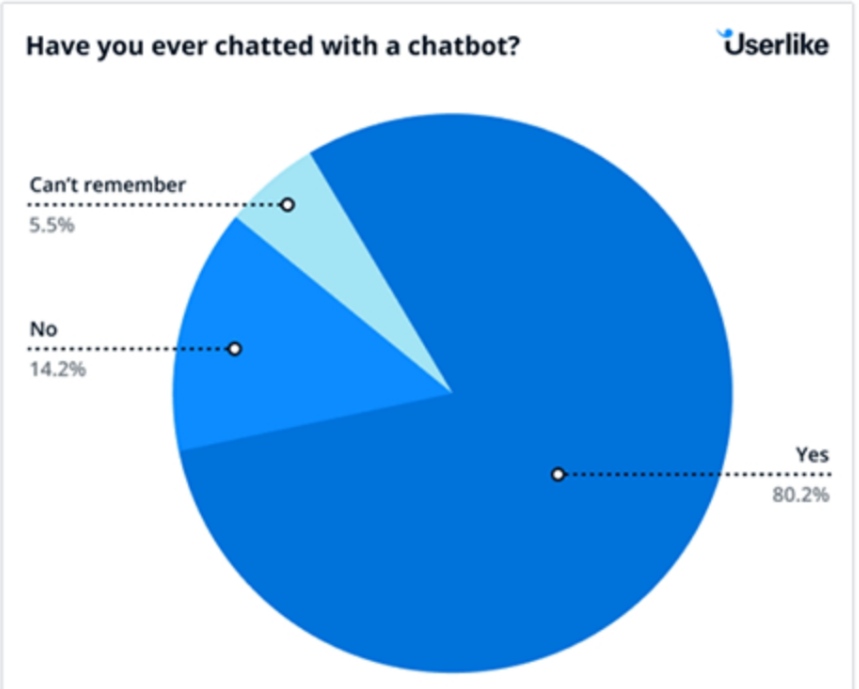
Moreover, they can generate an emotional appeal by using machine learning and natural language processing to learn from previous conversations and make rapid improvements. As a result, the conversation goes smoothly, and you have a higher chance of retaining customers.
Computers are much better than humans for information gathering, which helps AI chatbots for customer service fetch all the essential things about customers. As a result, they can make the conversation more personalized and tailor their content accordingly. As a result, there is a 24% increase in customer satisfaction, as customers think the company cares about them.
Customers are looking for information, and if they don't find it, they get frustrated. Here, chatbots can play a key role:
Humans must eat, rest, change shifts, and sleep, but AI chatbots for customer service don’t require any of that. Moreover, the quality might vary according to who is on the chat and their mood. An exhausted person might reply passively, which directly hits customer satisfaction. On the contrary, AI chatbot customer service is homogenous and is available 24/7 for maximum flexibility. As a result, companies have to face 70% less inquiries on calls, chats, and emails.
When a business grows, it has to deal with more customers, resulting in a need for more customer care employees. Moreover, peak hours or sales usually see higher traffic on your site, which requires many customer care representatives to handle the queries. With AI chatbot customer service, you don’t have to worry about the number of requests, as they can handle everything effectively.
Today, 39% of customer-business interactions involve AI chatbots. Hiring customer care representatives or worrying about proficient responses is unnecessary.
A direct impact of having a dedicated customer care team is that you pay them a significant amount of money. According to estimates, chatbots can save businesses 30% of customer care costs by automating tasks. With constant refinement in their training data and responses, AI chatbots for customer care can handle tasks effectively and won’t let you feel the absence of humans in the customer care department.
Let’s now discuss the best chatbots for customer service.
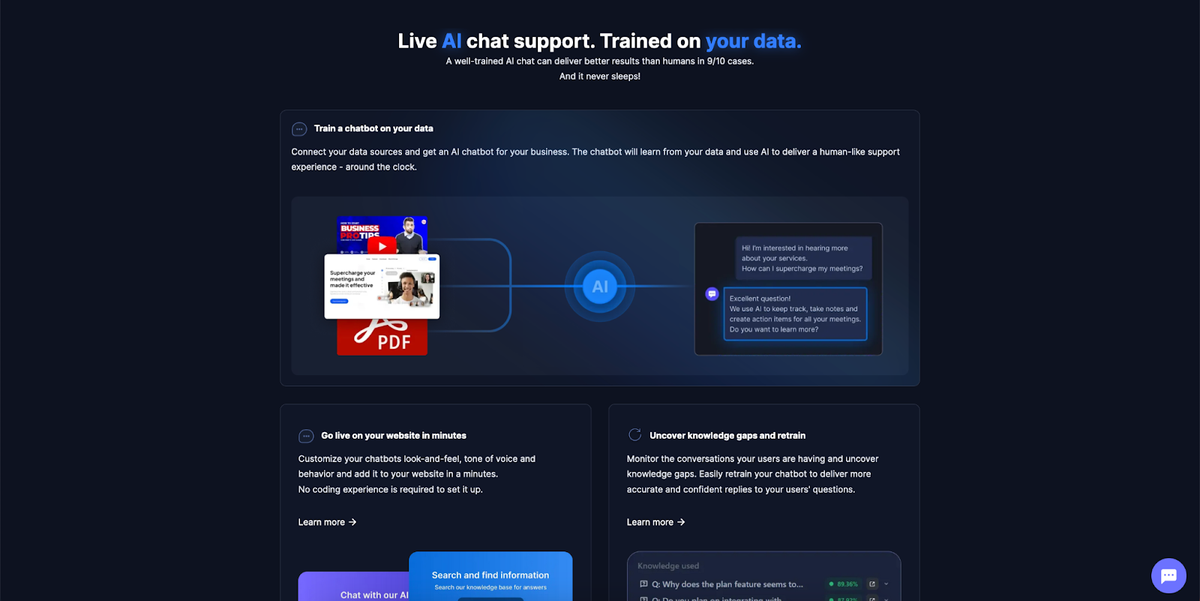
If you're asking what is the best AI for customer service, your answer lies in Aidbase. This chatbot is the first on the list for a reason: it offers everything that you need in AI chatbot customer service that can replace humans in 90% cases. This AI support platform is highly customizable for both data and appearance. You can train it on any dataset and build a comprehensive chat response mechanism like Chat GPT. Moreover, you can also tweak its look, behavior, and tone.
This AI support chatbot lets you monitor and scrutinize all the conversations it has with customers to identify any knowledge gaps. As a result, the chatbot can give highly accurate responses, which is crucial for customer satisfaction. You can train the chatbot using various sources, such as your website, YouTube videos, and documents. It learns from auditory and visual elements in videos, white papers, reports, and internal guides.
You can also modify the chatbot appearance with your own logo, colors, and dark or light mode. The light mode is perfect for well-lit environments, while the dark mode works well in dimly lit environments. According to reports by Verint, the majority of the customers think AI chatbots are helpful in at least one way. The reason behind this positive outlook is excellent tools like Aidbase.
Let’s get into some pros and cons of one of the leading AI customer service platform.
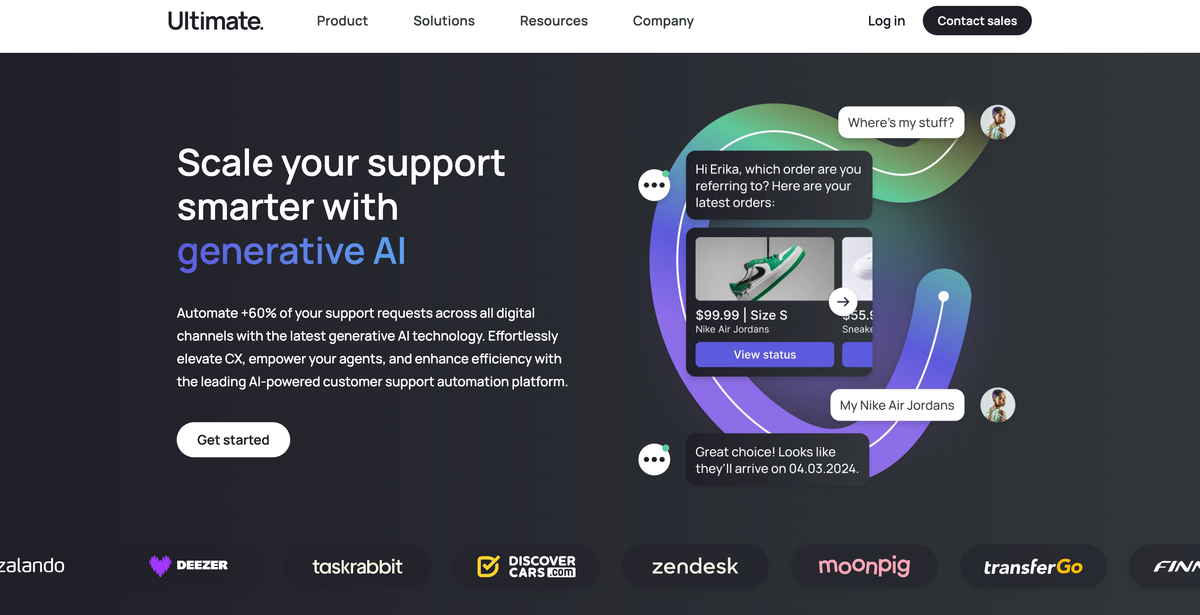
Ultimate is among the leading names in the world of AI chatbot customer service. Supporting 109 languages, Ultimate is a no-code platform that also offers an intuitive Dialogue Builder. As a result, teams can build advanced conversation flows and make the whole experience more enjoyable for customers.
Ultimate has a proprietary language detection model with a high level of accuracy and is specifically designed to understand short customer responses. Moreover, it doesn’t rely on a translation layer since it is language-agnostic.
Ultimate’s AI customer service chatbots blend seamlessly with your existing tech stack and other CRMs, such as Zendesk, Freshworks, Salesforce, and more. Moreover, API integrations allow you to connect the chatbot with your backend systems, automating complex tasks. It can easily automate repetitive tasks and answer questions from different sources, such as email and social media platforms. Ultimate also provides advanced analytics and multilingual reports to help you monitor your bot’s performance.
Ultimate has developed a leading AI chatbot customer service that helps the bot learn from its own previous data. As a result, you get a tailor-made chatbot that learns and improves continuously. The company has also released UltimateGPT built using generative AI with four personas, adopting whatever tone you want, making it one of the best AI customer services.
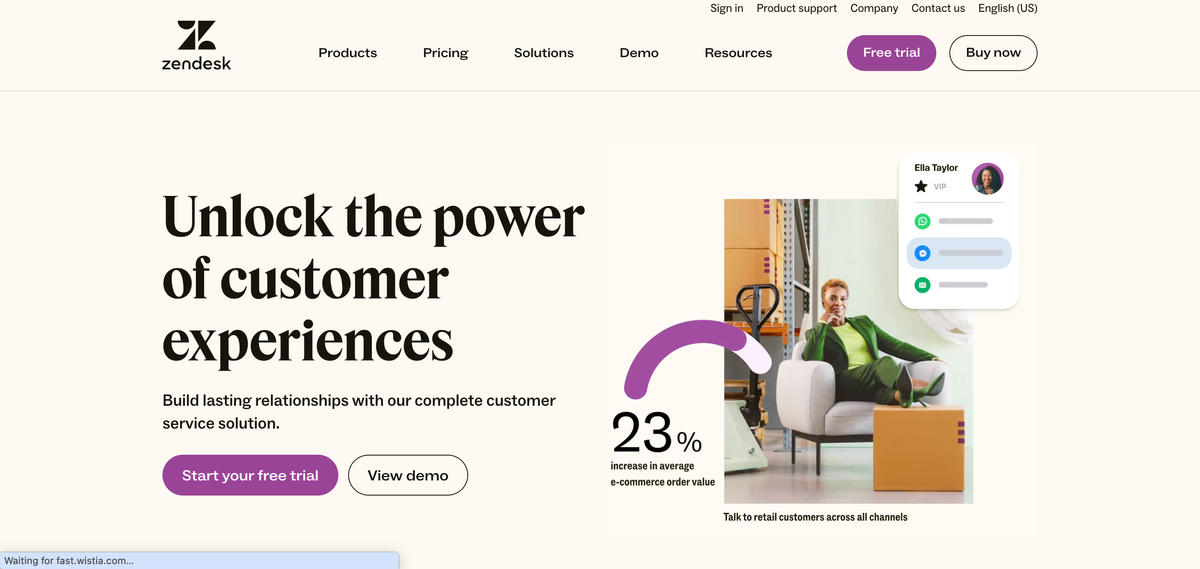
Zendesk customer service chatbots excel at efficient customer care responses, one of the key factors in assessing any bot. In fact, they were specifically built for AI chatbot customer service, which is why the company trains them on millions of data points extracted from other conversations. As a result, the bots learn how to respond to customers’ queries effectively. Their most significant advantage is that businesses don’t have to hire multiple people or bear the costs of a manual setup.
Zendesk allows you to use these customer service chatbots across all customer channels, helping you respond to customers on various platforms without delays. These bits can also recommend articles from the help center if you have them on your website.
The company also offers a click-to-configure mechanism with a simple visual interface. It helps businesses develop elaborate and customized bots without writing a single line of code. Small and medium-sized enterprises can benefit from it, as they no longer need to spend a lot on customer care. Moreover, the Zendesk ticketing system can seamlessly integrate with these customer service chatbots.
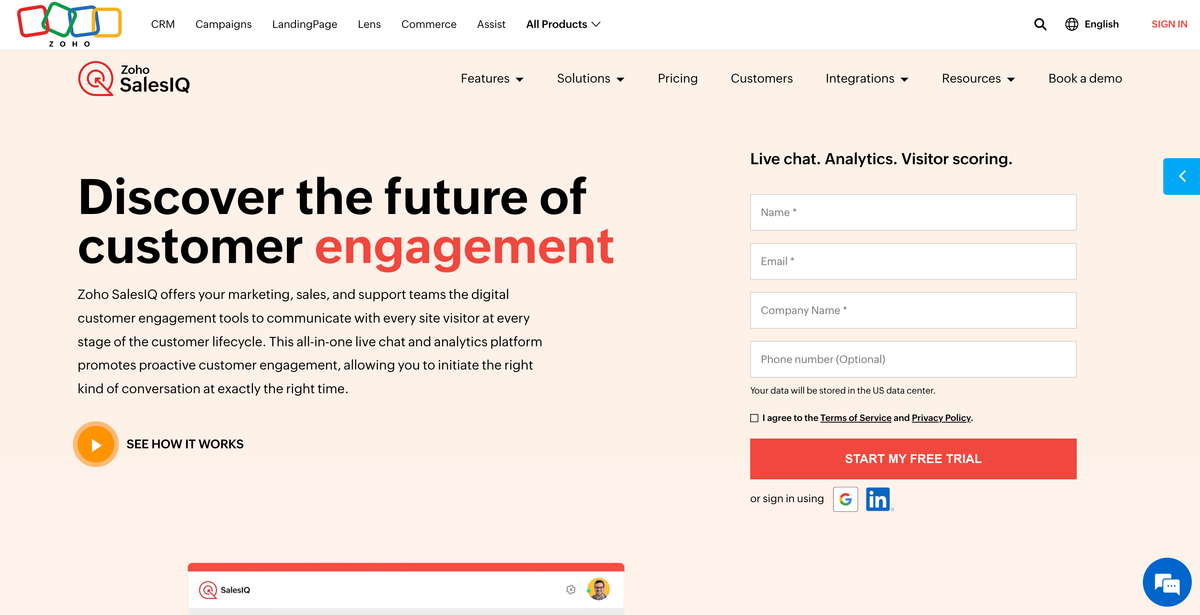
Zoho offers Zobot, an enterprise-grade chatbot builder, which Zoho SalesIQ customers can use. It is an excellent option for businesses without a programmer because it uses a simple drag-and-drop interface for easy access. Businesses can type in predefined responses or create the flows they prefer without writing code.
However, businesses must train these customer service chatbots using FAQs, articles, documentation, etc. The more it is taught, the better it performs in tricky customer care situations. Sometimes, the bot might not find an answer, indicating it needs further training. A business can ask the customer care department to train the AI customer service chatbots regularly with newer and better data to update its knowledge base.
Zoho doesn’t eliminate human intervention, however. It offers a virtual assistant called Zia to help agents write replies, dig for customer account information, and recommend relevant tags for notes. One of the best things about this bot is that it answers frequently asked questions and provides shopping recommendations.
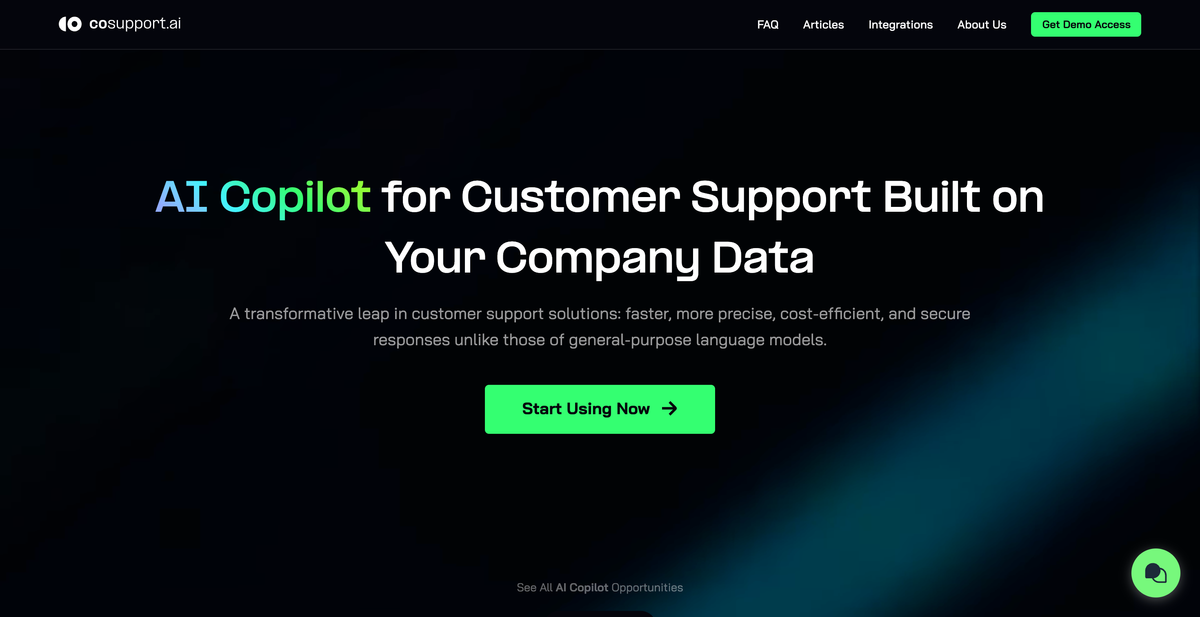
CoSupport AI uses generative AI capabilities for advanced-level customer responses and improving the efficiency of response teams. The company has prioritized AI chatbot customer services, adding several components to provide a realistic, human-like response experience. The two primary components of this chatbot are:
The CoSupport Customer, as the name suggests, handles customer queries. It provides instant answers to multiple questions and fully uses its knowledge base. On the contrary, the CoSupport Agent helps agents by providing context-based information. As a result, customer support agents don’t have to put too much effort into their work, reducing the need for hiring multiple humans.
The company has also obtained a patent for its CoSupport AI solution, making it a highly credible AI chatbot customer service. Several things favor this product: efficient responses, accuracy, cost-effectiveness, and anonymized data handling. Moreover, you can easily integrate this platform with existing CRMs, such as Zendesk, Freshdesk, and others.
The company provides a free AI customer support bot demo so businesses can make an informed decision. However, those who want to use a paid model can request pricing brackets.
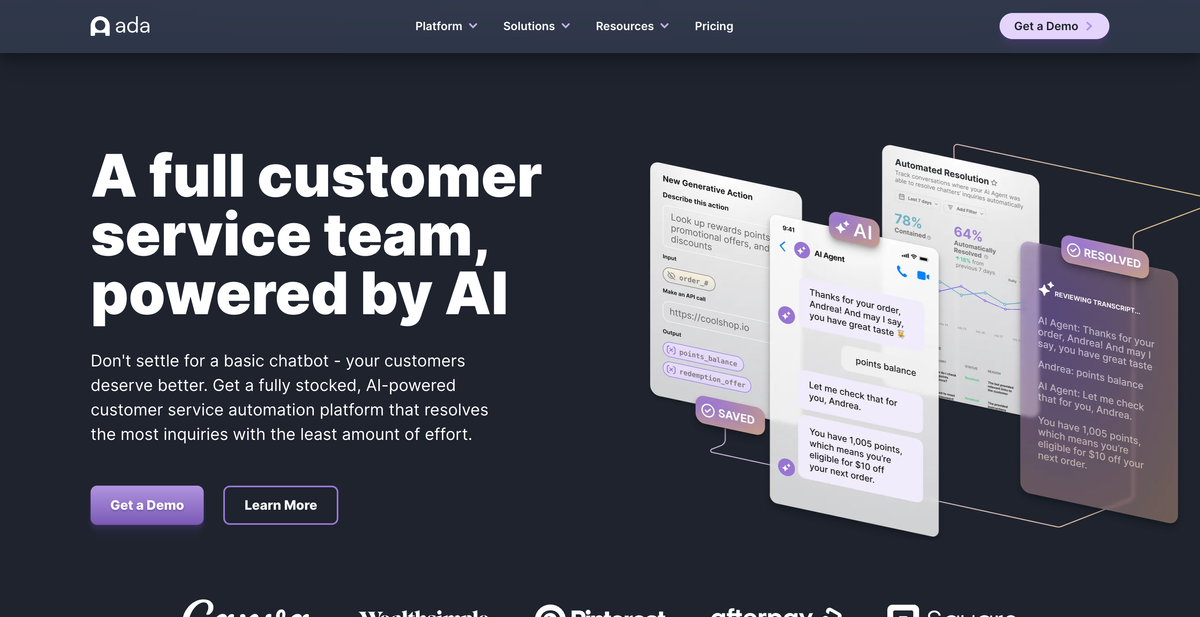
When one understands the capabilities of Ada, it becomes why it is one of the most in-demand AI chatbots available today. Powered by AI and NLP, it is a fully automated bot that mimics human reasoning and understanding through the Ada Reasoning Engine. As a result, this artificial intelligence customer service bot is capable of providing human-like and rational responses.
Another commendable aspect of these customer service chatbots is its variety, which means businesses from all sectors can use it effectively. From SaaS to fintech, various companies can handle customer queries and offer high-quality responses using Ada. Moreover, the knowledge builder of this bot works perfectly without coding, so you don’t need to hire a programmer. You can create complex workflows by training the bot on various data points without requiring any technical expertise.
These customer service chatbots also leave the space open for human intervention because, let’s face it, bots aren’t perfect yet. So, if there is a mishap or the bot cannot answer any questions, the human agent can seamlessly sit in the driving seat and take the action forward without the customer realizing it.
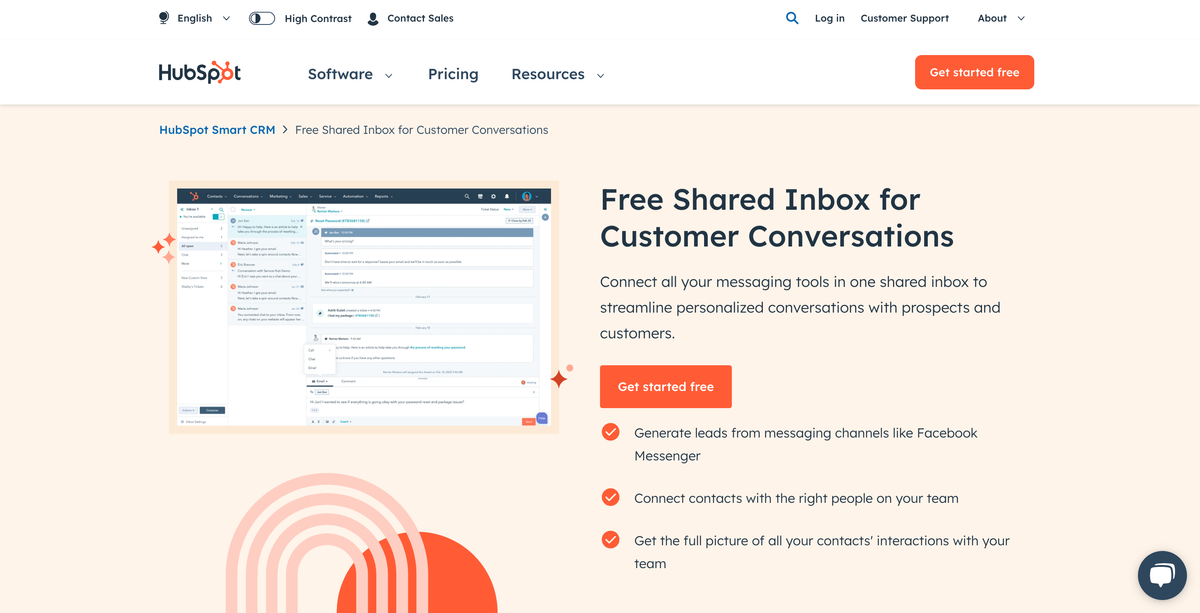
HubSpot has an excellent inbound marketing platform supporting a chatbot called Hubspot Conversations. It was launched by Motion AI back in 2015 and has gone through a significant evolution in the last nine years. Today, it has become one of the best customer service chatbots.
One of the reasons behind its popularity is the unassuming chat widget that blends seamlessly with various websites. Customers can ask questions, and the bot will answer them instantly without affecting the website’s performance or loading times.
Besides that, these customer service chatbots offer various features that streamline customer interactions and make them more intuitive. Customers can book meetings and sessions easily with this platform. It also generates instant support tickets for customers. As a result, they feel their voice heard and are likely to return to the same business.
However, the biggest downside of HubSpot Conversations is that it doesn’t use AI and NLP capabilities to the full extent. Therefore, its effectiveness is limited to an extent where other chatbots excel. That’s not to say it cannot offer quality customer responses. It’s just that it can do much better if HubSpot integrates full AI and NLP capabilities into this platform.
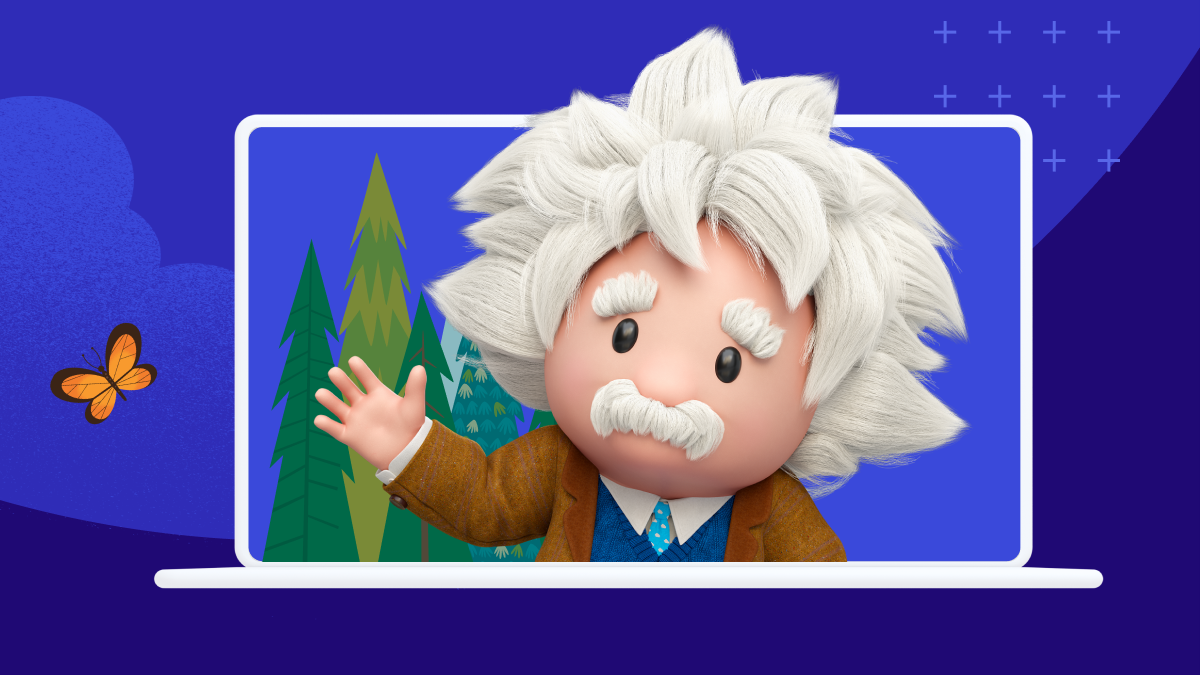
This chatbot is a fusion of two impressive AI worlds: Salesforce’s proprietary AI and Open AI’s technology. Previously, Salesforce offered the Einstein bot, which was replaced by the currency iteration. Since it combines the capabilities of two world-class companies, it can help businesses fine-tune emails and rapidly respond to frequently asked questions. Therefore, it allows companies to resolve tickets quickly and help more customers in less time.
Einstein GPT also helps various teams in a business to collaborate on customer data by collecting and unifying it. Whether it’s sales, IT, or marketing, customer data is critical to all teams, and the best way to collect it is through customer conversations.
One downside of this tool is that it requires significant technical expertise that every business doesn’t possess. Moreover, Salesforce doesn’t offer any pre-training for their tool, which makes it even more difficult for some businesses to do the initial setup and update it in the future.
Although companies can solve this problem by hiring a quality coding professional, small businesses might not have that luxury.
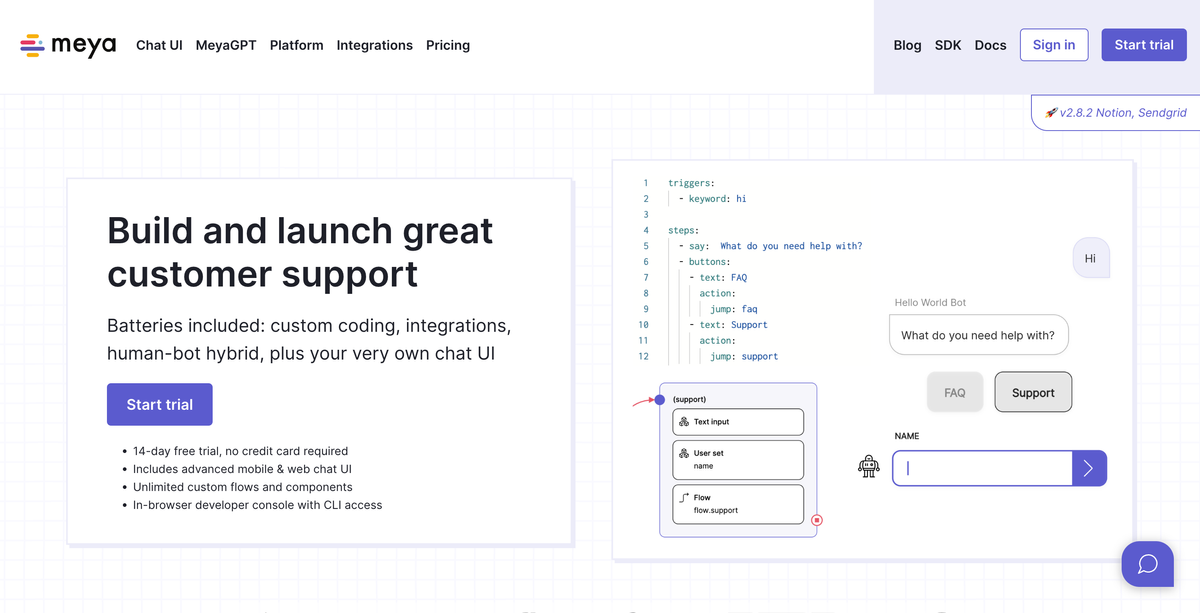
This chatbot is a comprehensive automation platform built using Grid, Orb, and Console elements. These elements work in different capacities to make Meya what it is. Grid works at the backend, where businesses can generate conversational workflows through coding in several languages.
The Orb is the heart of these customer service chatbots, the chatbot that customers interact with regularly. It can be customized and configured according to customer’s needs and can be embedded in various platforms and websites. The Console allows multiple teams to create and use conversational experiences.
Businesses can create complex bots with complete backend support with these three elements. As a result, the bots keep learning new data and offer better responses. Moreover, Meya provides a comprehensive, integrated development environment (IDE) that helps businesses build new bots quickly.
These integrations aren’t just helpful for customer responses; various teams can use them to improve work efficiency. The bot analyzes all messages coming through the CRM and responds instantly if it knows the answer. Pausing or continuing the bot is also quite simple: when an agent responds to a customer, the bot can be paused and unpaused when needed.
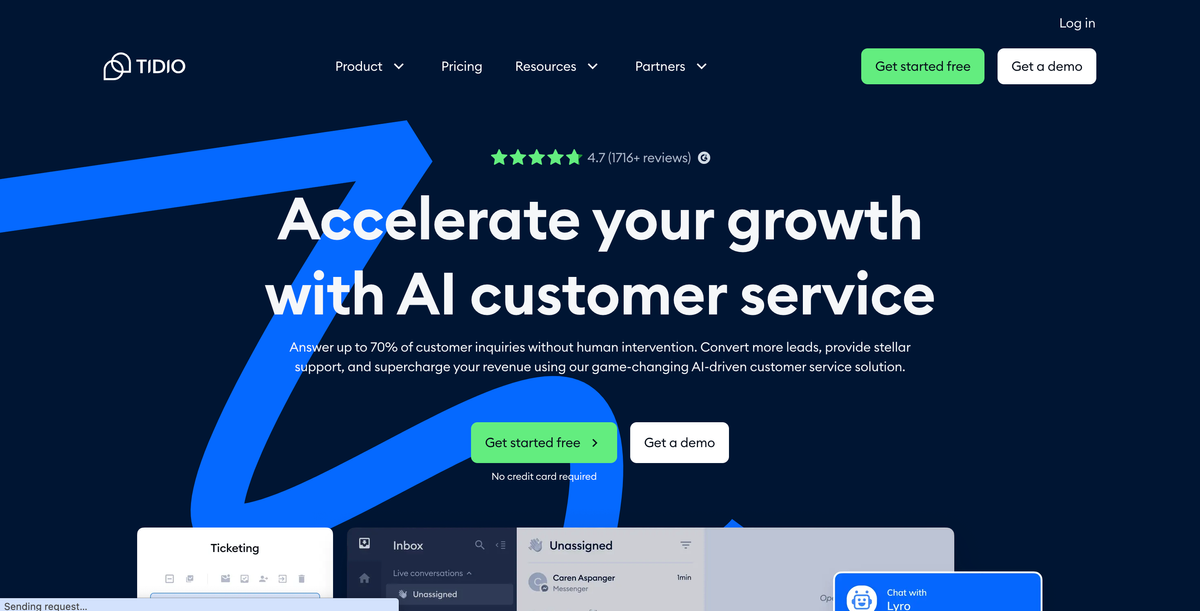
People have given many positive reviews to this chatbot, and for good reasons. Tidio combines AI and human capabilities, providing the best of both worlds. It offers multiple chat templates so businesses are always prepared to handle customer queries, including greetings, lead collection, product recommendations, FAQ responses, and much more.
The most important aspect of these customer service chatbots is its real-time user tracking. It can go a long way in addressing customer queries through the lens of behavior. When you know how a customer behaves, you can address their questions more accurately and effectively. With multi-channel support on a single dashboard, you can connect with users on various platforms like Facebook Messenger, chat, and email.
Tide’s analytics and feedback game is also vital. You receive regular reports about your bot’s performance, indicating its weak spots. You can address these weak links by training the bot with better data and improving its response quality. By automating customer services alongside sales, Tido can help you grow if you use it the right way.
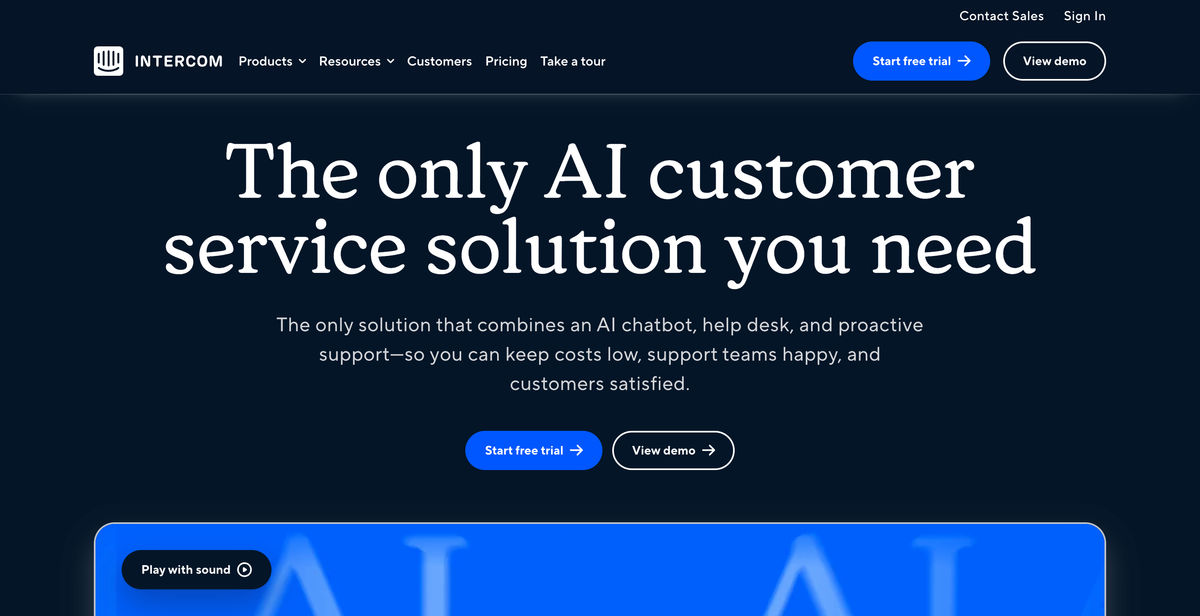
Intercom can handle all kinds of customer queries, from shipping to product features, thanks to its AI capabilities. It is one of the most advanced AI chatbots integrated with multiple channels, such as Instagram, WhatsApp, and email, to help businesses connect with customers wherever needed. This chatbot as a service understands complex customer queries within their context and provides human-like answers without any hiccups.
One aspect that makes Intercom so popular is its learning capability. Training is quite simple, and businesses don’t have to do much. It learns from various sources, such as the help center, blogs, articles, and whatnot. As a result, you can see significant performance and response quality improvements. Thanks to its efficient nature and rapid learning capabilities, it can help businesses save a lot of time and money.
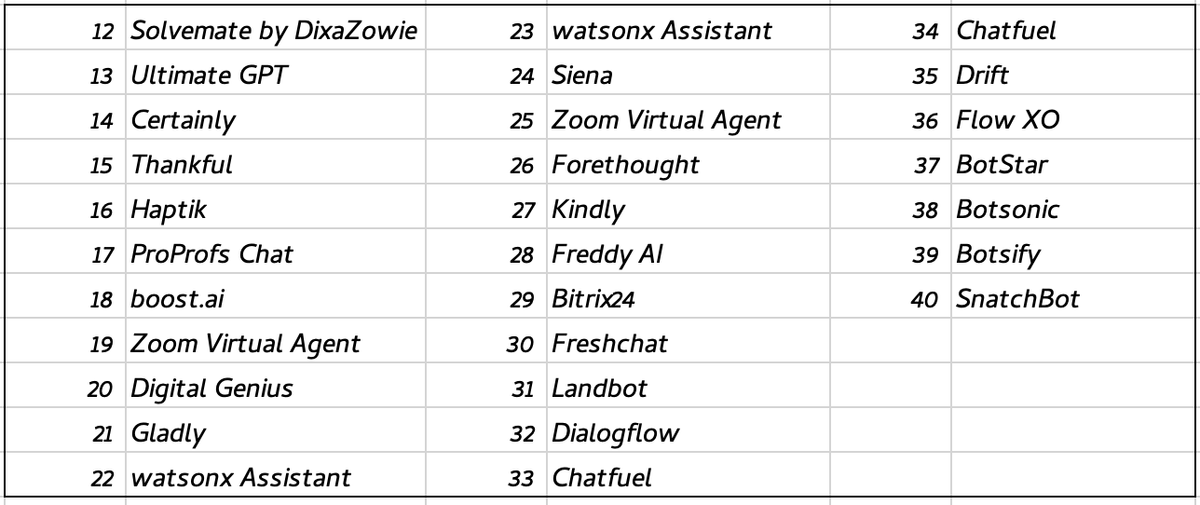
AI chatbots are the future of customer care, as they can handle several customers simultaneously and generate human-like responses quickly. It is expected that bots will be the primary customer support mechanism for 25% of companies by 2027.
Aidbase is the perfect example here, one of the best customer service chatbots, offering advanced AI capabilities that easily surpass other AI support systems on the market. It provides customized training, 24/7 response, zero coding requirements, and rapid training.
Contact us today, pick the package that suits you best, and enter a new era of customer care with Aidbase.